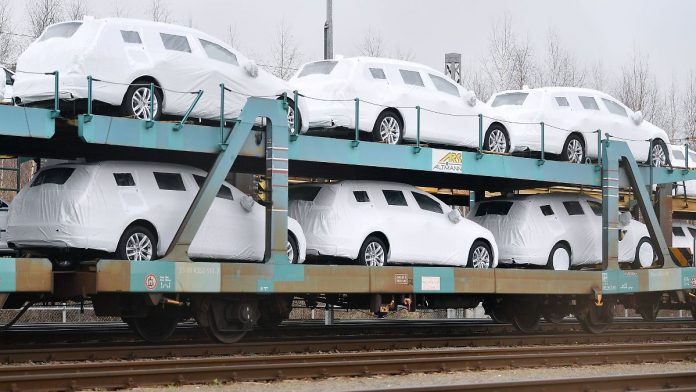Situation “extremely tense”
Car sales fall by almost a third
This audio version was artificially generated. More info | Send feedback
The new car market continues to decline. Electric cars in particular have seen massive losses compared to the previous year. One expert sees several reasons for the tense situation, but also attributes the slump to special effects that distort the balance sheet.
Sales of new cars collapsed in Germany in August. According to the Federal Motor Transport Authority (KBA), 197,322 new cars were registered – a decrease of 27.8 percent over the year. This is mainly due to the recent weak demand for purely electric cars. But the numbers also fell significantly for almost all other types of drive.
According to the KBA, around 69 percent fewer electric cars were newly registered in August than in August of the previous year. For cars with diesel engines, the decrease was 24.4 percent, and for cars with petrol engines, it was 7.4 percent.
The Germans’ willingness to consume is low
“The current slump in the German new car market is not yet a sign of a negative trend reversal, but is mainly due to special effects from the previous year. Nevertheless, it remains to be said that the situation on the new car market is extremely tense,” said Constantin Gall of the EY consultancy about the figures. “We are far from a sustainable recovery, and the gap to pre-crisis levels remains very large.” So far this year, almost 590,000 fewer new cars have been sold in Germany than in the same period in 2019, i.e. before the corona pandemic.
In Gall's view, there are several reasons for the ongoing weak sales in Germany: “The German economy is not gaining momentum, the willingness to consume and invest among private individuals and companies is very weak,” he said. “Geopolitical tensions and armed conflict are also putting a damper on sentiment. There is currently no sign of any positive dynamic.”
E-car subsidies distort the figures
In view of the few new registrations of electric cars, EY pointed out that an unusually high number of such vehicles were newly registered in August 2023. At that time, last-minute purchases by commercial customers had driven up new electric registrations – before the expiration of state subsidies for companies on September 1, 2023. According to the KBA, 13.7 percent of the cars newly registered in August 2024 were purely electric cars – EY calls this the “new normal”. From January to August 2023, the share of electric cars in all new registrations was 18.6 percent.
While new registration figures have plummeted, car production in Germany grew significantly in August compared to the same month last year. According to the Association of the Automotive Industry (VDA), 313,700 cars were manufactured in Germany in August – 24 percent more than in August 2023. Since January, a good 2.7 million cars have been produced in Germany – two percent less than last year. “Compared to the pre-crisis year of 2019, however, production after eight months of the current year was still 14 percent below the previous year's figure,” said the VDA.


